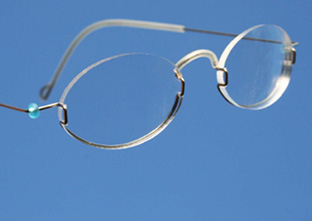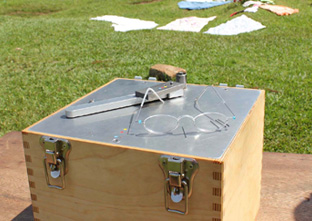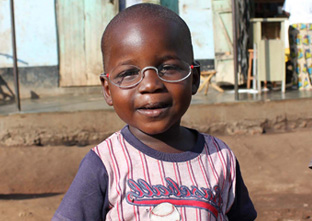OneDollarGlasses: high quality eyewear even the poorest can afford.

Did you think about using a mineral rather than organic glass for your spectacles? And why go with polycarbonate which isn’t commonly used in this field ?
About 150 million people worldwide suffer from poor vision. They could be helped by just an ordinary pair of glasses, but have no access to an optician and often no money to buy them.
The OneDollarGlasses project aims to provide these often isolated communities with high quality spectacles at prices even the poorest can afford.
There was no way we could use glass lenses which require electrical power and water to grind and polish before assembly.
So we went with prefabricated polycarbonate lenses to meet our chosen standards. Firstly, because as a polymer it has greater tensile strength than the glass or resin commonly used in our countries. These lenses are also cheaper to make, very light and more easily clipped into our system frames.

Why did you choose steel for the frames rather than the more usual plastic ?

We went with steel frames on quality and production grounds. We use stainless steel spring wire, which is non-irritant and extremely lightweight. Most importantly, though, especially in the difficult conditions of developing countries, is its high strength and flexibility. This guarantees them for long-term use and lets us make custom lenses tailored to the individual.
The big advantage of this material is mainly to enable frames to be made quickly just by bending without the need for electrical power in the mobile workshop we have developed.
You aim to train opticians who can go on to develop their own business. How much will that cost ? How can those who want to, finance it ?
 OneDollarGlasses is a non-profit organisation. Our concept is based on the principle that we fund the business start-up by paying for the cost of training, the bending machines and all the equipment the optician needs for the first 500 pairs of glasses.
OneDollarGlasses is a non-profit organisation. Our concept is based on the principle that we fund the business start-up by paying for the cost of training, the bending machines and all the equipment the optician needs for the first 500 pairs of glasses.
The mobile workshop, bending kit and lenses are all owned by OneDollarGlasses to start with, to ensure the standard and performance of the business. But as soon as the optician starts selling his eyewear and earning enough to live on and pay for the existing or new equipment, he can order supplies from OneDollarGlasses. That is what makes our concept truly sustainable.
How many opticians are there operating at the moment ? And about how many glasses have they made ?
Burkina Faso, for example, has seven optician/spectacle-makers who have sold upwards of 500 pairs of glasses to date.
Worldwide, we have thirty-odd opticians operating. Our staff are currently training new aspiring opticians in Benin and assessing the performance of the first OneDollarGlasses opticians in Nicaragua.

How do you see the future of what you are doing ?
 Our potential "market" is huge, and equal to our aim of providing glasses to those millions of people for whom it is an almost vital need! But our resources are limited, so obviously we are going one step at a time with projects targeted in individual countries. In Africa, for example, we are operating in Rwanda whose very poor population of 11.4 million people has only 11 ophthalmologists! A pilot project was also started up in Tanzania in summer 2013.
Our potential "market" is huge, and equal to our aim of providing glasses to those millions of people for whom it is an almost vital need! But our resources are limited, so obviously we are going one step at a time with projects targeted in individual countries. In Africa, for example, we are operating in Rwanda whose very poor population of 11.4 million people has only 11 ophthalmologists! A pilot project was also started up in Tanzania in summer 2013.
In September 2013, training also got under way in Santa Cruz, Bolivia, where about half the population is rural and so has no access to eye care.





